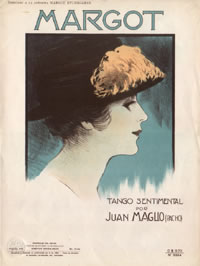 Did you know that I have my own tango? Indeed, I do. OK, it was written by Celedonio Flores back in 1921, almost half a decade before I was born, but it is my tango anyway. While the name Margarita is common in many Latin American countries, it wasn’t very popular when I was a child in Argentina (I was named after my grandmother who was actually a Margaret, not a Margarita, but you could only give your children Spanish-language names in Argentina back then). So I never met another Margarita until I came to the US.
Did you know that I have my own tango? Indeed, I do. OK, it was written by Celedonio Flores back in 1921, almost half a decade before I was born, but it is my tango anyway. While the name Margarita is common in many Latin American countries, it wasn’t very popular when I was a child in Argentina (I was named after my grandmother who was actually a Margaret, not a Margarita, but you could only give your children Spanish-language names in Argentina back then). So I never met another Margarita until I came to the US.
“Margot” is a very famous tango, and as the only Margarita around, whenever people heard my name, they were reminded of the tango. No matter that I was a young child and this tango involves the life of a girl who has become a prostitute – that is a very common theme for tangos. Indeed, even my 5th grade teacher took to calling me Margot. I did not take offense.
I’ve looked for a translation of Margot to English, but I couldn’t find it. So I’ve tried to translate it myself. Unfortunately, this tango like most other tangos, uses a lot of lunfardo and while I know quite a bit of lunfardo due to listening to tangos, I don’t know the precise nuance of every word – much less the perfect word with which to translate it into English. So it’s just a best, fast effort. Please leave comments below and I’ll use them to improve the translation.
Meanwhile here is my tango, Margot:
One can tell from afar, you well heeled tramp,
that you were born in the squalor of tenement in the barrio…
Because there is something that betrays you, I don’t know if it is your eyes,
your way of sitting, of looking, of standing
or that body so used to percale clothes.
That body that today moves to the tempting beats
of a street tango in the arms of some idiot,
while your curves and your colorful dress triumph,
among the laughter and compliments of your fan boys,
amidst the smoke of Cuban cigars and French champagne.
It’s a lie, it wasn’t an indolent and high handed tough guy
nor a dangerous pimp who led you to vice…
You rolled on your own and it wasn’t innocently…
Obsessions of wealth that you had in your mind
from the day that a high class magnate flirted with you!
I remember, you had barely anything to wear,
today you wear silk dresses with rococo roses,
I hate your presence… I’d pay to not see you…
they have even changed your name, as your fortune has changed:
you are no longer my Margarita, now they call you Margot!
Now you go with the idiots to act all posh
in an luxurious reserved booth at the Petit or the Julien,
and your mother, your poor mother, washes the whole week
to be able to fill her soup pot, with Franciscan poverty,
in the sad tenement house, lit with kerosene.
Se te embroca desde lejos, pelandruna abacanada,
que has nacido en la miseria de un convento de arrabal…
Porque hay algo que te vende, yo no sé si es la mirada,
la manera de sentarte, de mirar, de estar parada
o ese cuerpo acostumbrado a las pilchas de percal.
Ese cuerpo que hoy te marca los compases tentadores
del canyengue de algún tango en los brazos de algún gil,
mientras triunfa tu silueta y tu traje de colores,
entre risas y piropos de muchachos seguidores
entre el humo de los puros y el champán de Armenonville.
Son macanas, no fue un guapo haragán ni prepotente
ni un cafisho de averías el que al vicio te largó…
Vos rodaste por tu culpa y no fue inocentemente…
¡berretines de bacana que tenías en la mente
desde el día que un magnate cajetilla te afiló!
Yo recuerdo, no tenías casi nada que ponerte,
hoy usas ajuar de seda con rositas rococó,
¡me reviente tu presencia… pagaría por no verte…
si hasta el nombre te han cambiado como has cambiado de suerte:
ya no sos mi Margarita, ahora te llaman Margot!
Ahora vas con los otarios a pasarla de bacana
a un lujoso reservado del Petit o del Julien,
y tu vieja, ¡pobre vieja! lava toda la semana
pa’ poder parar la olla, con pobreza franciscana,
en el triste conventillo alumbrado a kerosén.

Recent Comments